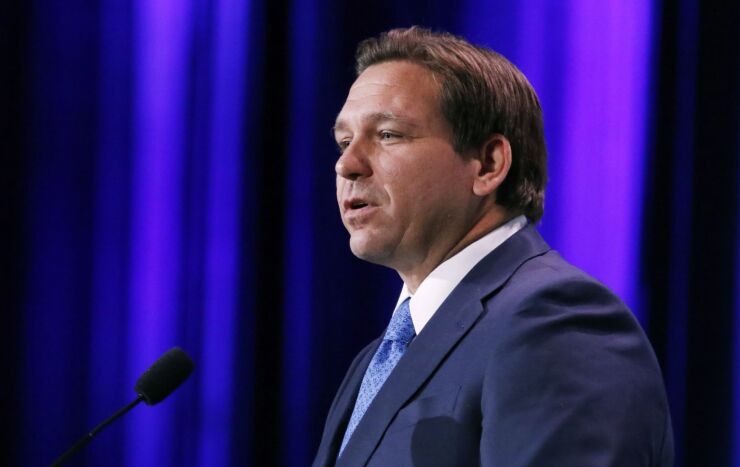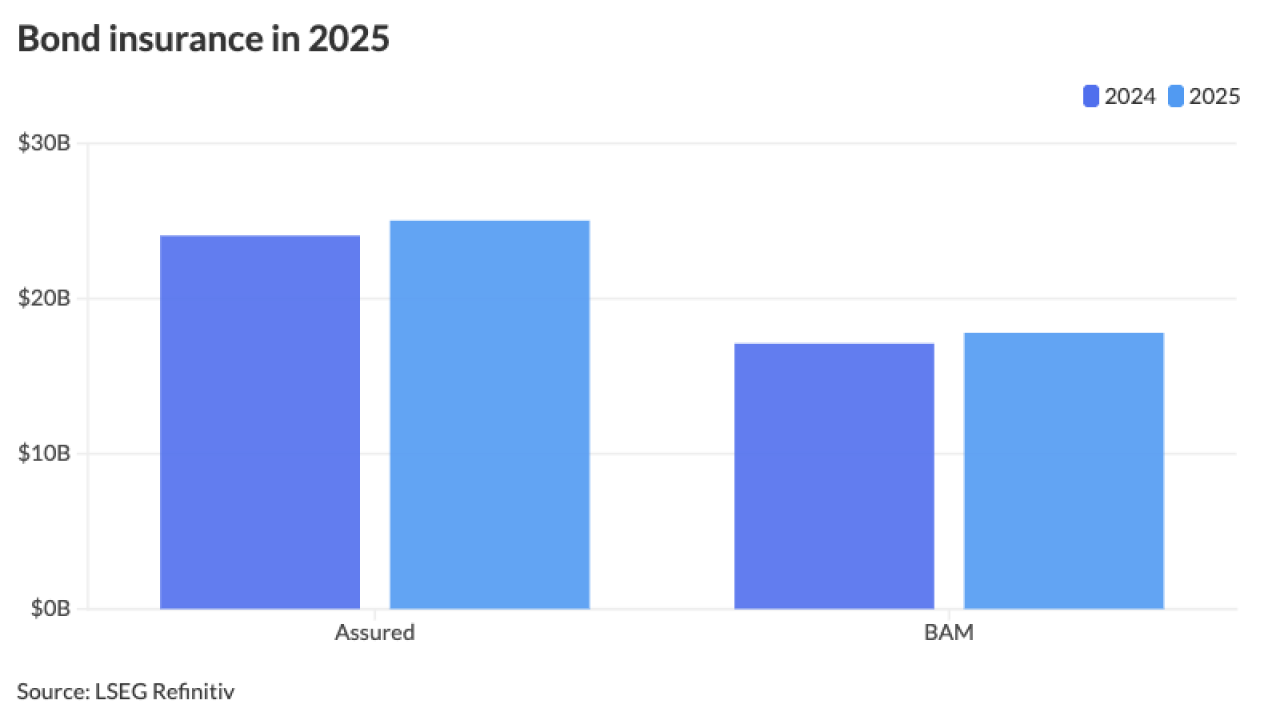The municipal bond market has always operated at the intersection of politics and finance, but lately politics seem to have taken center stage.
The latest salvo comes from Florida Gov. Ron DeSantis' announcement this week that The Sunshine State would move to ban local and state issuers from consideration of environmental, social and governance factors when floating bonds. That includes a "contract prohibition on ratings agencies whose ESG ratings negatively impact the issuer's bond ratings," the governor's office said in a press release.
"We're going to make sure that ESG is not infecting other decisions at both the state and local governments," DeSantis said Monday at a press conference with state legislative leaders proposing a

DeSantis, considered a likely challenger for the Republican Party's 2024 presidential nomination, is pushing against what he says is a use of ESG factors to pursue a "woke" liberal agenda that harms the American economy and energy independence.
Last year, he
The move is part of a growing trend of anti-ESG legislation across Republican-led states that has, over the last two years, ensnared the muni market.
Since 2021, 18 states have proposed or adopted legislation or regulation limiting the ability of the state government to do business with financial institutions that restrict funding to certain industries, like firearms or fossil fuel, based on ESG criteria,
In the muni market, the policies have targeted underwriters as well as ratings agencies that use the criteria and investment firms that manage public pension money.
DeSantis' proposal would drag issuers into the fray.
"It's hard to deny that to some degree it feels like ESG investing, even in the muni space, is getting sucked into the culture war debate," said Adam Stern, co-head of research at Breckinridge Capital Advisors.
It's unlikely that Florida, which issues its state debt competitively, would move to ban underwriters, said Ben Watkins, the state's director of bond finance.
"That's a Texas thing," Watkins said. "Limiting competition is problematic."
With no bill yet putting into action DeSantis' declaration, it's unclear how the state would limit Florida's issuers from considering ESG factors. DeSantis' office did not respond to a request for comment.
The bill will likely be sponsored by Republican Rep. Bob Rommel in the House, said House Speaker Paul Renner at the press conference. Lawmakers convene for the 2023 session on March 3. Republicans added to their lopsided Florida majorities in the November election in which DeSantis was reelected with more than 59% of the vote.
Watkins said he expects the bill will focus on so-called labeled or green bonds and not ESG-related disclosure, an area where he says Florida, with its vulnerability to climate change, has acted as a leader.
"The disclosure piece is an entirely different issue than the marketing of labeled bonds and those are the two issues that get conflated," Watkins said.
Labeled bonds, he said, are a "marketing gimmick that investment managers use to raise cash." The proposed bill, which Watkins says he hasn't seen, may declare "we're not playing that game in Florida."
DeSantis' proposal to restrict issuers from hiring ratings agencies "whose ESG ratings negatively impact the issuer's bond ratings," would "put a stake in the ground" to challenge the agencies, which have said their ESG considerations don't lead to rating downgrades, Watkins said.

"My personal point of view is I resent the migration of this political issue into what's traditionally been an apolitical space," he said.
The lack of clarity around the difference between ESG disclosure and labeled or green bonds is helping drive the politicization of ESG, said Nikolai Sklaroff, the capital finance director of the green bond-issuing San Francisco Public Utilities Commission, and a member of the Government Finance Officers Association influential debt committee, which is focused on ESG best practices.
"That's a nuanced distinction that's gotten lost in the political conversation," Sklaroff said.
Any move to restrict issuers from issuing labeled bonds or more broadly consider ESG factors would be "ill-advised," said Barry Fick, executive director of the Minnesota Higher Education Facilities Authority, which has issued labeled bonds with more deals coming this year. He has said the green label
"It's not something that's suddenly new and thought up by individuals who are saying we have a liberal agenda," Fick said. "If you look at the majority of the items and the factors that are included in the ESG analysis, most of them are items that are normally looked at it in credit rating analysis and by investors anyway," he said. "The restrictions would mean less information than we have always provided for a multiple number of years, so [now] investors are going to say, 'I'm going to have less information than I had before ESG and now my risk increases, so I'm going to have to accommodate that risk by either charging a higher interest rate or asking for more difficult covenants.'"
Restricting the supply of underwriters as Texas is doing carries pretty clear borrowing costs, said Dan Connelly, a senior advisor at Econsult Solutions Inc., which in January published a
"We found that there is going to be a cost on the order of magnitude of millions of dollars" for other states who impose similar restrictions, Connelly said.
Looking at Kentucky, Florida, Louisiana, Oklahoma, West Virginia and Missouri, where similar restrictions
The ESG policy landscape is "very political" and "very dynamic," Connelly added, noting that
The political focus on ESG is yet another episode in the long game of the muni market, said Tom Doe, president of Municipal Market Analytics, Inc.
"I feel like I've seen these cycles happen again and again," Doe said. "I don't see this as being something that's going to transform the market for the next 10 years."
The spigot of federal money that has flowed to states and cities since 2020 has put governors like Texas Gov. Greg Abbott and DeSantis in a fiscal position to pursue the anti-ESG agenda, Doe said.
"It's an unintended consequence of all the federal money that's been provided to the states," he said. "You're able to do it because you're in an advantageous position, but things go in cycles, and when you need money, you're going to have to look at things differently, and you won't be able to make these choices."
For the buyside, which is driving the ESG trend, anti-ESG state legislation like that proposed in Florida would likely have an effect "only on the margins," as federal securities law requires the disclosure of material factors, Breckinridge's Stern noted.
"The language suggests that the folks who are writing this legislation think it's never material," but "that's not something we find," Stern said. "There's many investment managers, including Breckinridge, who have invested in getting physical climate risk data and they're doing it because they think there's some there there."
State legislation that would ban working with ratings agencies could hurt cities, Stern added. "I have a hard time believing that what they're after is to shrink the number of rated issuers in Florida."
DeSantis said he expects other states to follow in Florida's footsteps. Muni market participants said the politics are too fluid to predict whether the ESG debate would lead to a bifurcated market that features some issuers touting ESG credentials and others minimizing or ignoring the factors.
"The most important thing I learned about bonds is that our marketplace is all about supply and demand," Sklaroff said. "To the extent other issuers are shrinking the potential buyer base for their bonds, I can't explain why you would do that," he said. "The demand for the green bonds is coming from investors, and if others don't satisfy that demand, those of us who do are likely to benefit."





